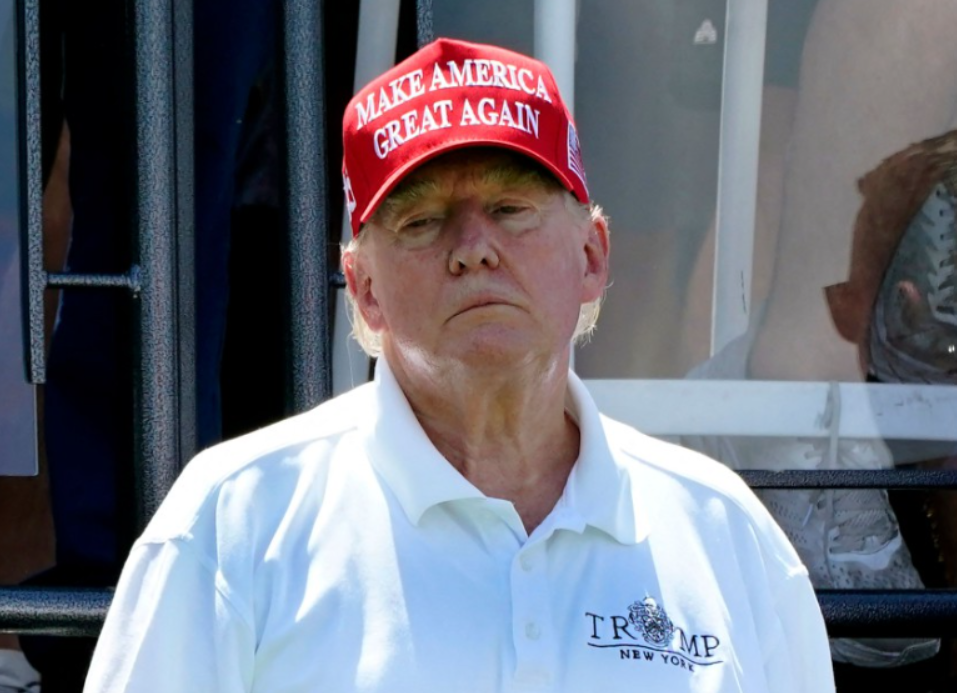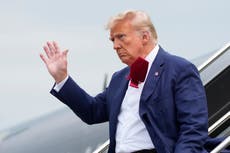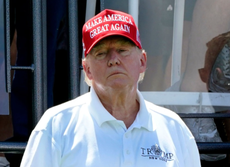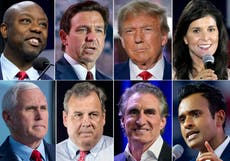Trump may be down, but he isn’t out – yet
A televised trial of the former president could make a great spectacle – but it won’t stop Trump securing the Republican nomination, writes Mary Dejevsky


The charges brought against Donald Trump by the US state of Georgia this week represent far and away a bigger threat to his ambitions than all the other legal threats piled up against him. This is because they are at once the most political – in the sense that they involve conspiracy to overturn the results of a democratic election – and the least political, in the sense of being least liable to be influenced by the political sympathies of a jury or public opinion.
The point is that to secure a conviction, a prosecutor has to match the evidence with the letter of the law. And the evidence that is already in the public domain in this case – an audio recording of Trump asking for the reallocation of votes – seems pretty damning. Short of finding a lawyer who would cast doubt on the authenticity of that recording – and it has not been challenged hitherto – it is hard to see much room for anyone to argue that the call meant anything other than it appears to mean: that the man who was still US president was trying to alter the genuine result of a democratic vote.
The other charges facing Trump seem either less damaging or less clear-cut. The hush-money case brought in Manhattan has elements of “he said/she said”, and the odds are that it could be settled with money or plea-bargained away. The charges relating to classified documents squirrelled away at Trump’s Florida estate offers various potential escape routes, including the fact that other presidents – including Joe Biden – have done it, and that at least some of the blame can be shuffled off on to others, including members of staff. That is not a noble way to proceed, but then Trump has no claim to nobility, only to survival.
On the face of it, the federal charges relating to the Capitol Hill riots of 6 January, 2021, are the closest to those being brought in Georgia, in alleging an attempt to overturn the result of the election. But there are differences, and they may well be easier for Trump to contest. Whereas at least some of the Georgia charges look cut and dried, many of the whys and wherefores of 6 January still depend to a degree on interpretation.
I have seen nothing, for instance, in any of the material so far made public that would convince me as a juror that Trump set out to cause a riot or march his “troops” to invade the Capitol. The extent of his responsibility for what happened will – in the absence of anything new – thus lie to a degree in the eye of the beholder.
Obviously, Trump’s refusal to accept his defeat in that election was the spur for his followers’ descent on Washington. But Trump was entitled to challenge the result and withhold his concession. Given the disputes in Florida in 2000, where the integrity of the voting was, rightly, called into question and there turned out to be no reliable mechanism for a recount, a candidate defeated in a close presidential race has some leeway to challenge until the vote of the electoral college has taken place.
The continuing polarisation in the United States, between those for and against Trump, could thus have a bearing on any 6 January verdict in a way that is unlikely to be replicated in Georgia. A conviction – not just of Trump, but of his 18 alleged co-conspirators – would seem far simpler to achieve, though doubtless appeals would follow.
But here’s the rub. The Georgia trial has provisionally been set for 4 March, 2024, which happens to be the eve of so-called Super Tuesday, when a dozen or more states hold their primary elections. No evidence will have been heard by the time those votes take place, which could be enough to secure the nomination for him. And if the trial is televised, which it might well be, the 2024 presidential election could take on a whole new dimension.
At the very least, the stage would seem to be set for a tantalising race of competing timelines: the electoral timetable running from now until 5 November next year, and the judicial timetable, which looks destined to be punctuated with hearings and trials for the duration. The star defendant meanwhile remains the favourite to win the Republican nomination, with his chances likely only to improve as his troubles with the law mount. The theatre alone would be worth watching, as Trump, his private plane and his motorcade are tracked rushing from courthouse to courthouse via adulatory rallies on the campaign trail.
So what, if anything, could stop his name appearing on the 5 November ballot paper?
First, what won’t stop him is a criminal conviction. Only “insurrection” or “rebellion” present constitutional bars to becoming president, and none of the multiple charges facing Trump rises (quite) to that level. In theory, it would seem, he could run for the presidency even from a prison cell, and then pardon himself once he had taken office. Such a prospect may exist only because the founding fathers and their successors failed to envisage a candidate, such as Trump, whose popularity mounts in inverse proportion to his troubles with the powers that be. But, as things stand, he may run, captive or free.
Something else that won’t stop him is his disregard of political correctness. Attitudes and utterances that would blight the prospects of almost any other candidate leave him unscathed, as his misogynistic remarks at the height of the Me Too movement in 2016 showed. For some voters, his flouting of the contemporary canon is part of his appeal.
Nor, most likely, will his propensity to save himself at the cost of even his most loyal retainers stall his progress. He threw his former lawyer, Michael Cohen, to the wolves, suing him for breaching client confidentiality over some of his legal woes. Cohen is expected to testify against Trump in the hush-money case, but this may go on past the 2024 election.
Perhaps the most tragic figure here is Rudi Giuliani, the popular and effective New York City mayor in the 1990s. Having thrown his lot in with Trump, Giuliani now faces many of the same charges as his master, including the conspiracy indictments in Georgia – and without, it would appear, the means to contest them. He is reported to have put his Manhattan flat on the market and to have gone to Mar-a-Lago in person to plead for help from Trump, in vain.
Trump’s fleets of lawyers may know where sundry bodies are buried, but so far, with the limited exception of Cohen, they have refused to “sing”. That or their evidence has not been deemed worthy of a plea bargain. They may also be hedging their bets, in the hope or belief that Trump will become president again.
Which could leave money as the source of Trump’s greatest vulnerability, and the possibility, perhaps, of an Al Capone final act, where it is tax rather than “racketeering” – as it happens, among the charges facing Trump in Georgia – that gets him in the end.
Fighting the constant stream of cases brought against him carries a cost, as Giuliani well knows. Trump is no stranger to financial investigations, and federal tax officers are among those who wait in the wings. A candidate needs money to run for president, and while Trump still rakes in the funds, his outgoings inexorably mount. Could he run out of money before he runs out of time? Or will it be left to American voters once again to decide his fate?






Join our commenting forum
Join thought-provoking conversations, follow other Independent readers and see their replies
Comments